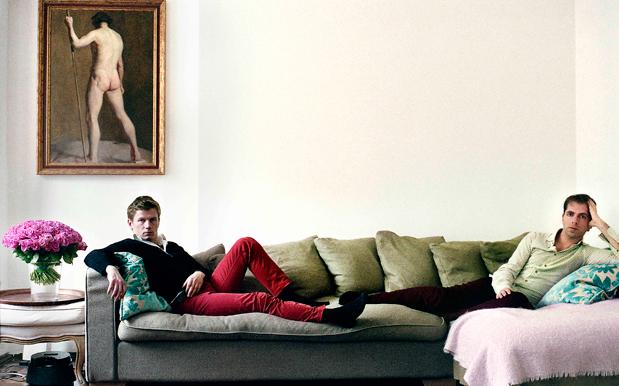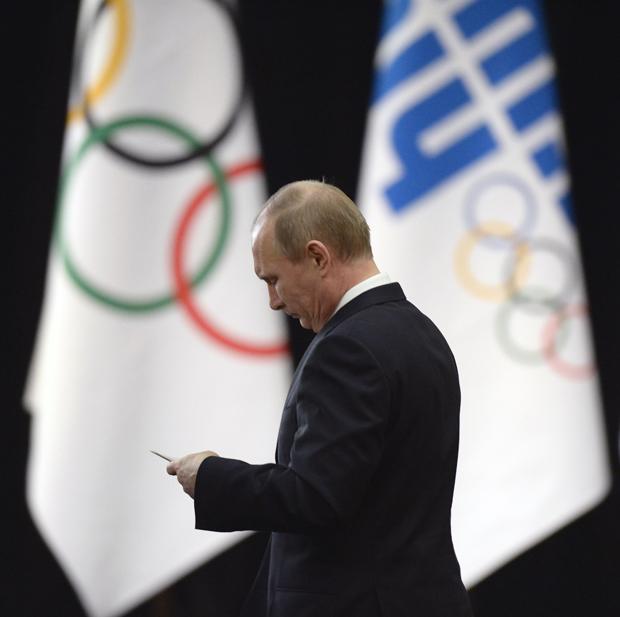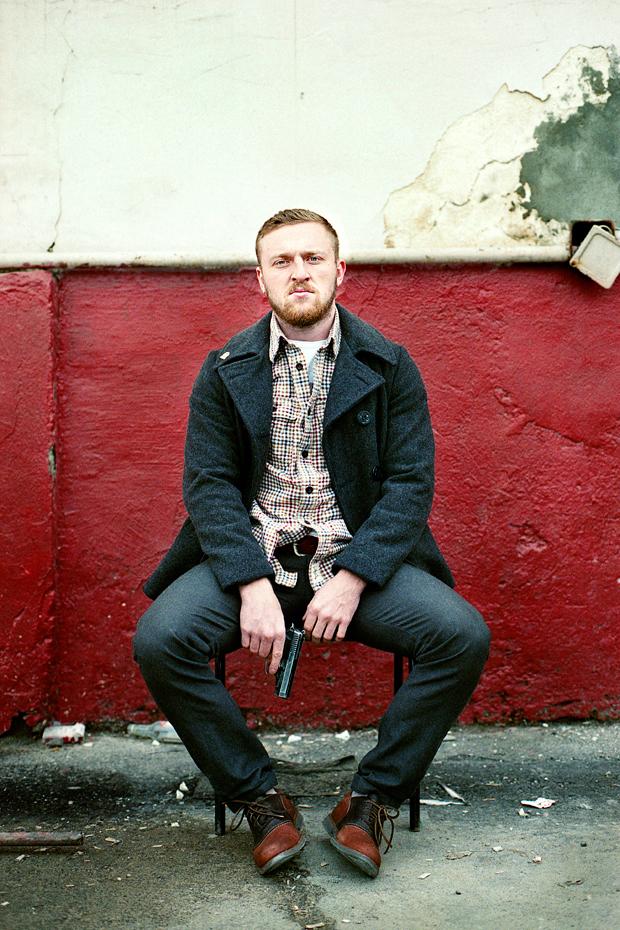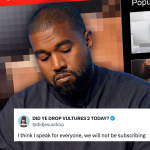On the eve of the Sochi Winter Olympics, the Human Rights Watch have released a video portraying with unflinching clarity the shocking violence perpetrated against LGBT citizens in Russia, cut together from footage of hate crimes posted online by vigilantes with the sole intent of inflicting further harm and humiliation on their victims.
These are victims that are either abducted from the street or lured and kidnapped under the pretence that they’re going on a date; victims who are then physically, violently abused while their assailants and the law enforcement officials who condone and are party to the same violence enjoy total impunity.
It’s viscerally sickening, wholly abhorrent, and yet entirely necessary viewing that needs to be cast in the same spotlight as the one that the international media will turn on Russia over the coming weeks. Keep in mind that while this is going on, international media delegates are making headlines by live tweeting their disappointment with the lack of a turndown service, potable water or door knobs in media hotels.
On a recent self-funded journey to Russia, Sydney-based photographer Isabella Moore documented in an eloquent and harrowing photo essay ‘Putin’s War On Gays’ the faces subject to this archaic oppression of civil and human rights. What follows are eleven portraits of LGBT Russians accompanied by a brief insight into the lives they lead under the duress of Russia’s anachronistic intolerance. Also featured are three additional portraits of two women who face the loss of their children on the basis of a false accusation and two men who put another kind of face to both the institutionalised and the vigilante abuse of human rights that both Russia and the IOC would prefer you didn’t see.
Photo: Vladimir Putin, Sochi, February 4 2014 – Alexander Nemenov via Getty
Recent laws determined by Vladimir Putin and the Russian Government restrict LGBT human rights, despite the decriminalisation of homosexuality in the constitution in 1993 and the removal of the term from the list of psychological disorders in 1999.
Since the ban on ‘propaganda of non-traditional sexual relations to minors’ bill was signed into law, the Russian Government has stigmatised LGBT people and prompted a devastating rise in homophobic acts of violence. Since there exists no law in the current Russian legislation that outlaws discrimination based on sexual orientation, these hate crimes seldom receive the deserved punishment.
The flood of anti-gay legislation continues with the prohibition of adoption rights to same-sex couples and a more recent bill filed on September 5th, which proposes stripping Russia’s gay, lesbian, bisexual and transgender parents of their children. Scheduled to go to vote in February 2014, the bill has been momentarily withdrawn by a member of the ruling United Russian Party, only to be re-submitted to the State Duma after the Sochi Olympics have concluded.
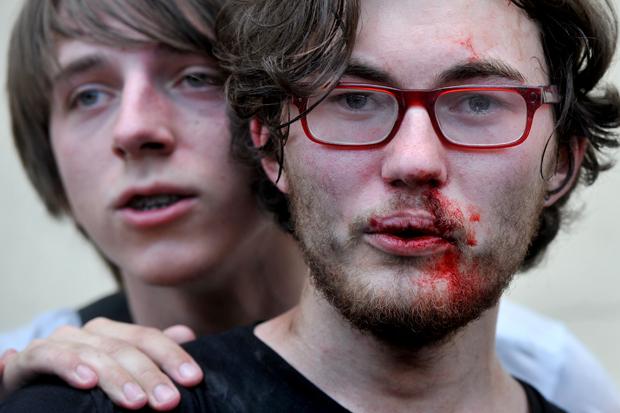
Photo: LGBT rights activists, St. Petersburg, June 2013 – AFP via Getty
There is considerable speculation of the motives behind Putin’s oppressive political regime. With the Russian economy in stagnation and the fear of loss of presidential popularity, in order to consolidate political power, Putin and his political allies in the Orthodox church are putting to work familiar totalitarian campaigns that appeal to the voting population’s prejudices and fears by legally marginalising minority groups and criminalising their behaviour.
Russian members of the LGBT community who are naturally born equal are socially ostracised from their community through the law, which institutionally devalues their personhood. Putin’s government and it’s latest emphasis on ‘patriotism’ and the ‘traditional family’ rubric together with it’s despicable view of the Western world’s liberalism, has heightened the homophobic atmosphere and casually stripped LGBT people of their basic human rights.
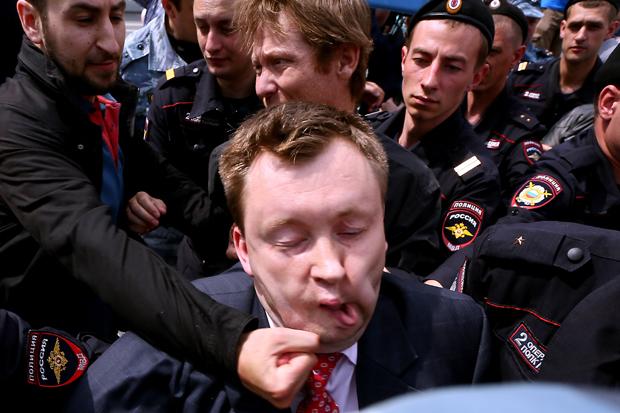
Photo: LGBT rights activist Nikolai Alexeyev, Moscow, May 2013 – AFP via Getty
This photo-essay is a collection of visual biographies, accompanied by textual testimonials; each represents a smaller part of the whole constellation of those directly affected by Putin’s oppressive regime. The current political climate in Russia means those dissenters and radicals who contend the current repressive structures of Putin’s government are immediately criminalised and at risk of imprisonment. This has most recently been seen with the arrest and detention of Nadia Tolokonnikova of Pussy Riot, who on August 17, 2012 was arrested and locked up for hooliganism.
Most disheartening about the current situation in Russia is the regression to a more intolerant and inequitable social arrangement in a country that once decriminalised homosexuality in an act that represented hope for the progress of its population.
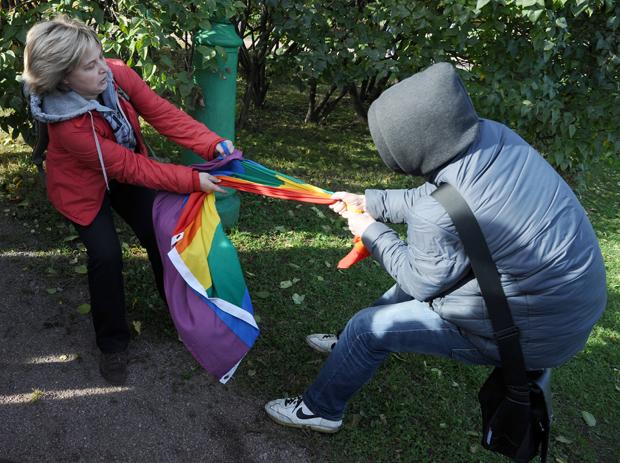
Photo: LGBT rights activist, Saint Petersburg, October 2013 – Olga Maltseva via Getty
Everybody told me not to go to Russia that it would be dangerous and some even thought I could get killed. Many Russians when I arrived told me I should keep quiet about the story. I arrived there with no knowledge of the language and one contact who would later transform into many, and before I knew it, I had more willing participants than I had imagined.
LGBT Russians are willing to put their necks on the line for the sake of their people. My visa only allowed me one month of stay, so I worked night and day, took as many portraits as I could and if I could still be there, I would. But it was self-funded, from my own initiative and with this comes constraints. At a time where most LGBT people are either living in great fear or hiding their true sexuality, it was a inspiration to see there were citizens who fearlessly took part in the story, giving up their privacy in order to let others see how the situation truly plays out for them in an extremely homophobic, Orthodox Christian dominated society.
Lelik and Aleksey
The new law has made Aleksey, 36, and Aleksey, 37, who work in the music business and IT respectively, think of leaving their homeland: “If there is going to be more aggression against gay people supported by the state, it is the only way to survive.”
Together for 11 years, they are disillusioned by the increasing homophobia of a Putin-led government: “We travel and we see that things are changing for gay people in many countries in a positive way. In Russia, because of President Putin, his KGB wing and the Orthodox church, things are likely to become more tragic for gay people.”
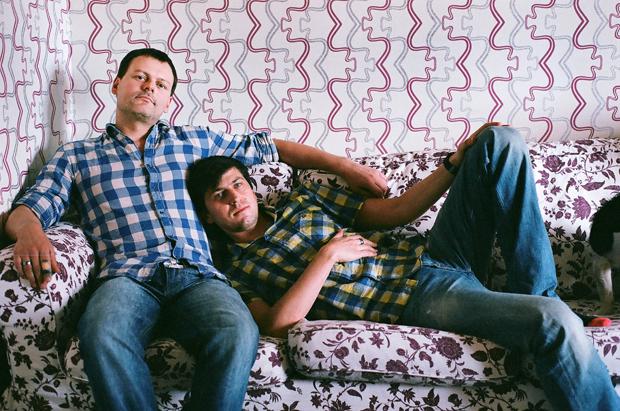
Irina and Olga
Irina Zlobina (seated) and Olga Kochetkova, both 41, fell in love in 1991, when they were 19. Olga says: “Our inner homophobia wouldn’t let us live together back then. This is why we broke up.” At that time it seemed nobody was openly gay in Russia. “Twenty years ago, Irina honestly thought that there were two gay people in the whole world: Sir Elton John and her,” says Olga.
They went on to have families and lives of their own but reunited seven years ago and now live together. “We don’t know what time will tell for us. The politics of Putin are criminal, almost fascist. Worst of all, young gays and gay families with children will suffer the consequences,” says Irina.
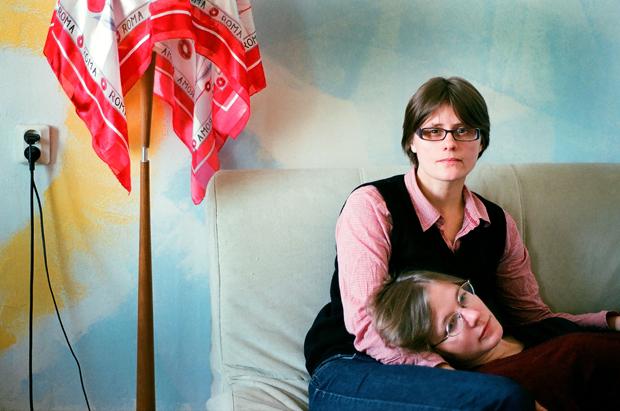
Andrey Bartenev
Andrey, 48, is a famous Russian performance artist who first rose to prominence in 1990s Moscow by orchestrating elaborate costumed performances. He represented Russia in the 2007 Venice Biennale. “Historically Russia was already a homophobic country, but after the Soviet Union collapsed in 1991 there was a new freedom where people could all live with ‘this gay and lesbian population’, and gay culture became a part of all culture,” he says.
Andrey’s reaction when asked if he’d like to step outside for the portrait is understandable given that Putin’s new law includes handing out hefty fines and imprisonment for homosexual propaganda. “I don’t want to spend any day of my life in prison, because I was not born for this,” says Andrey.
“I was born to show people lightness and fun, to exist.”
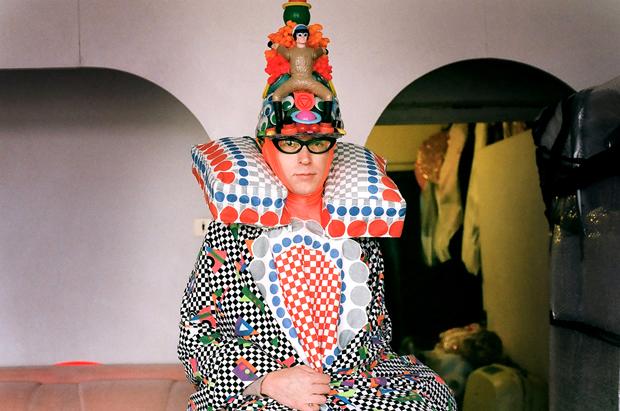
Kirill Kalugin
Kirill, 21, is a student at St Petersburg’s Polytechnic University. He became famous for holding a one-man protest at Palace Square during celebrations of Russian Airborne Troops Day on 2 August 2013, when he unfolded a rainbow banner reading: ‘This is promotion of tolerance’ and was attacked and arrested by uniformed veteran paratroopers within seconds. “The protests should make people think, reflect, and create discussions in our society,” he says.
“Protests that are seen by no one are useless.”
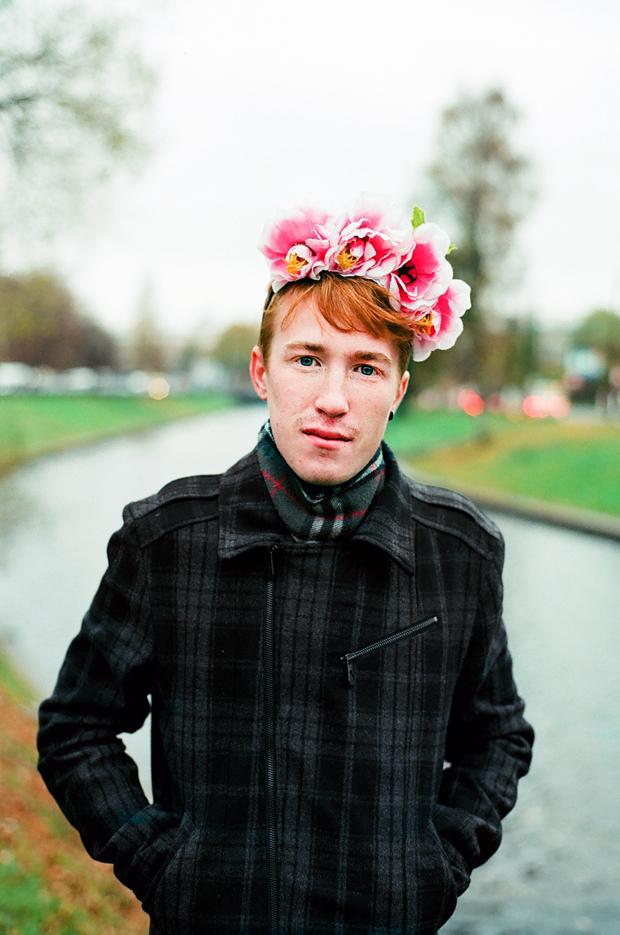
Nikita Gurjanov
Nikita, 17, born in Moscow, is at high school in the city’s centre. Nikita has been openly gay since he was sixteen years old, and is a member of Rainbow Association; a large organisation fighting for human rights for LGBT people, but he also wants to create his own local-teen organisation in the future. Nikita hosts his own YouTube channel, participates in street activism and actively helps teenage LGBT people like him with their problems, mostly to do with ‘coming out’ to their family and peers.
“Sometimes young boys and girls write me messages about how they must go about telling their parents, how can they come out, what must they do, they are afraid of society and of showing themselves, I told them everything is normal, they must not be afraid, I even talk with them on Skype and on the mobile, and sometimes I even meet them in real life and help them, if they live in Russia.”

Sergey and Philipe
Sergey, 33, and Philippe, 39, have been together for nine years and have a Pacs – a pacte civil de solidarité – which they acquired in France in 2010. This is a legally recognised form of partnership similar to marriage. Sergey is a journalist and Philippe, who is French, works in advertising. Philippe believes that Russia’s anti-gay law has “obliged the masses to speak about the minorities. Even Putin has spoken about homosexuals for the first time in casual terms, so it might bring some awareness. The debates that have occurred might have helped some people understand that homosexuals are part of the human species – like left-handed people or the ginger-haired.”
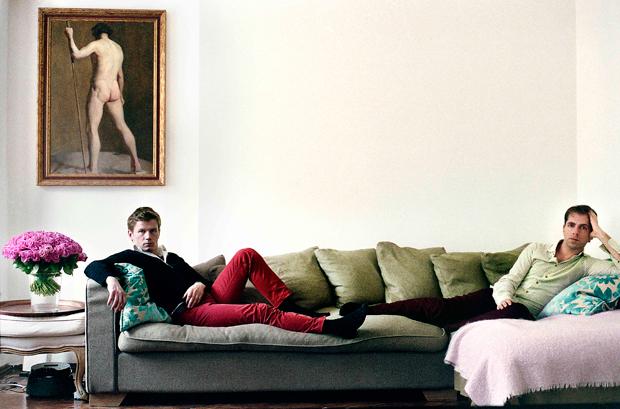
Vita Holkina
Vita, 17, fears that there will be no information or support when Russian youths struggle with their sexual identity. “When I was young and realised I was gay I didn’t have any problems accepting myself,” she says. “Nowadays, from their early childhoods, our children will be under pressure by their parents and other adults who will be telling them that being gay is bad.”
Vita talks of a recent case after the bill was passed in which two girls committed suicide by jumping from a roof: “Our government took no blame. They said every day somebody commits suicide and it had nothing to do with the new law.”
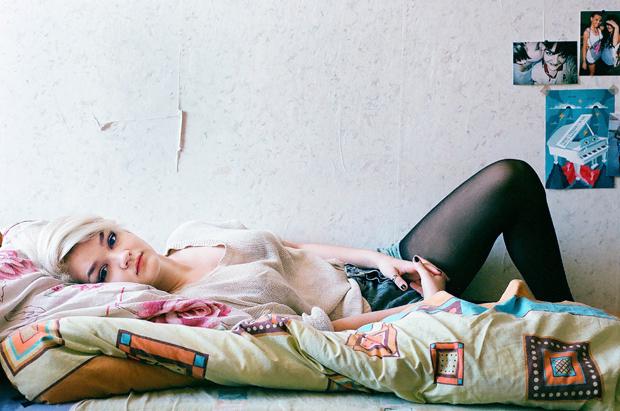
Irina and Svetlana
Irina Fedorishcheva, 28, and Svetlana Shompolova, 28, share a small apartment with Irina’s daughter Ekaterina, 7, and Svetlana’s son Alexey, 7. They are friends and have been renting the apartment they live in since July. They have both separated from their husbands – recently Svetlana’s husband falsely accused her of being in a lesbian relationship with Irina so that he could take custody of their son through legal action. Svetlana’s own parents also tried to take him purely because they believe she is a lesbian.
Local social services supported the move but, as the bill against gay parents was yet to pass, they had no legal grounds for removing the child. “There has been a 15 pages long psychological expertise presented in our court case based on Svetlana’s parents words that stated Svetlana, myself and our lawyer Anastasia were aggressive lesbians, crazy, that all gay people are horrible drunkards, having AIDS, obnoxious sluts and so on.”
Both 22, Vera Kichanova was born in Moscow and Paul Melkiades was born in an urban-type settlement named Glubokoye in Rosov Oblast in the year the Soviet Union collapsed. They got married to one another soon after meeting at an ‘Occupy’ protest in Moscow in 2012. They are members of the Libertarian Party of Russia, a political group that has not been officially registered yet. Vera was elected as a municipal deputy in Moscow’s Yuzhnoye Tushino district and during her election campaign she was in a relationship with a girl.
“It was not a secret, I published photos of us, we went out together…
after I was elected there were several
articles about me as I was seen to be
destroying moral values of the society
because of my bisexuality”.
Paul and Vera, were victims of an absurd homophobic attack by skinheads whilst on a night out in Moscow.
“It was clear the security guards were on the side of the aggressors:
I asked them to call the police, but they refused.
The next day one of the attackers sent me some threatening messages.
He warned us not to come back because we ‘looked gay’ and that
he and his friends ‘beat gays half to death’.”

Anton Kuzmin
Anton, 27, was born in St. Petersburg, which was named Leningrad at the time after Vladimir Lenin, the premier of the Soviet Union. Anton is a Christian and a Protestant and belongs to the United Methodist Church.
“I remember one Sunday my pastor read sermon on the extract from the letter of Paul, 1 Corinthians 6. This was the first time I heard the word ‘homosexualists’ within the church. It struck me. ‘It is a choice’, she said. ‘They, along with alcoholics, thieves, adulterers won’t possess the Kingdom of God.’ If I had more courage, I would have stood up and left the sanctuary.”

Masha Gessen
Masha, 46, pictured with her daughter, Yolka, 10, is a famous Russian political journalist. She lives with her partner and her two other children in Moscow, one of which she adopted from an Orphanage in Kaliningrad in 1997, (a right that no longer exists for LGBT Russians), but is in the process of moving her family to the USA for fear of losing her children to the hands of the Russian State.
“But who better personifies foreign
or western influence than LGBTs.
So we’re the first target but we’re
not going
to be the only target. It’s going to broaden out.”
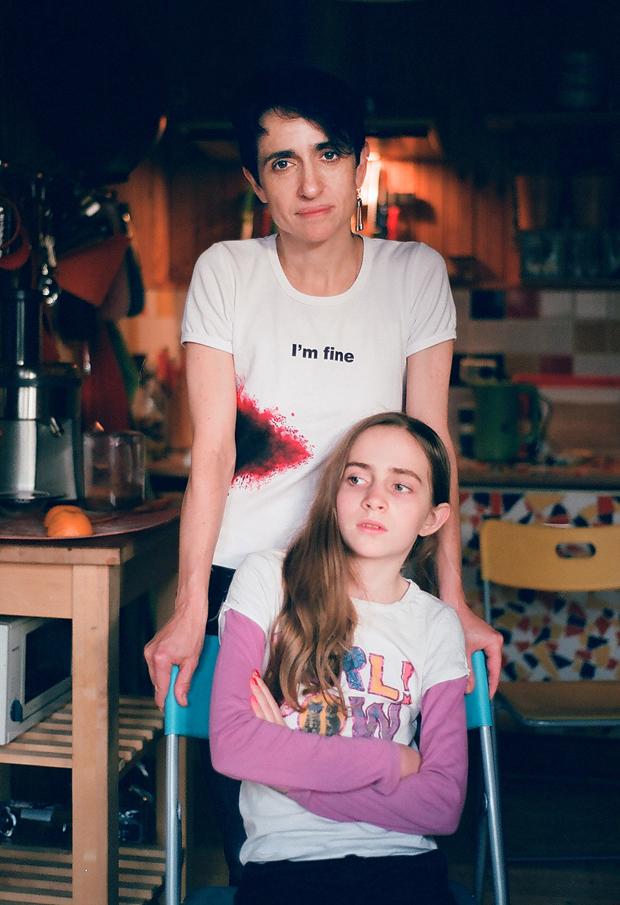
Sasha Calm
Sasha is 15 years of age, was born in St. Petersburg, is an openly gay teenager and is currently being home schooled.
“I became a second rate person instantaneously and everyone around me started acting as if they suddenly had the right to
humiliate and belittle me,
laugh at me
and call me names”
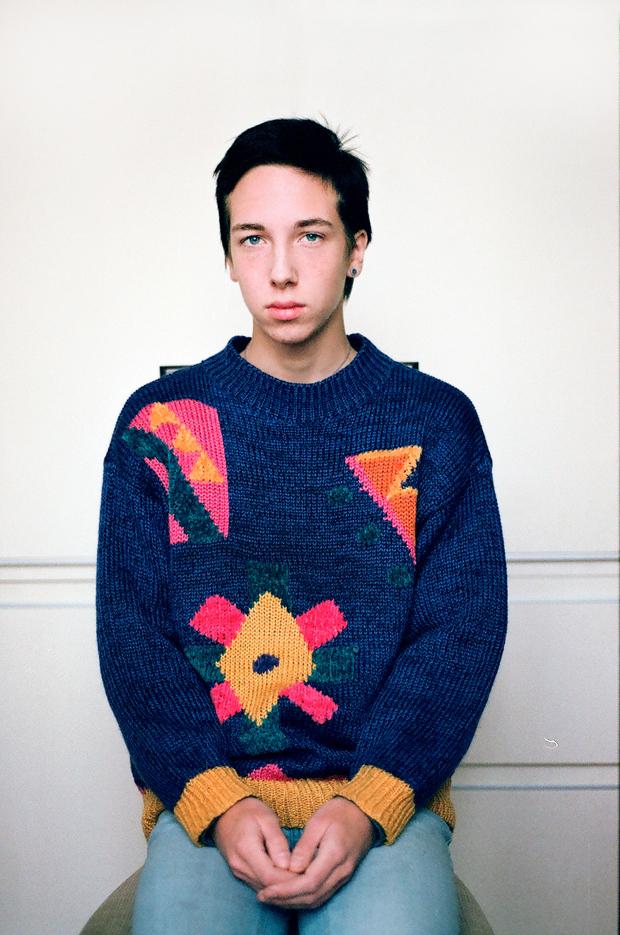
Dmitry Tsarionov
Dmitry, 24, is a Russian Orthodox Christian and calls himself a ‘theocrat’. He believes that any person clothed in authority, be it a tsar, president or prime minister, must trust in the law of God. Dmitry believes that homosexuality is a choice or an illness, paired with a sin to God, and explains how this illness can be cured through Christian values: “If you read a magazine about homosexuals, if you look at it, you will understand this sexual experience can help you have a good job and a good career, and if all the idols for society are gays, it is normal that you would become it,” Dmitry says.
“But if the society says no, it is a sin, it is awful, I think that there will be very few people who do it.” Another common belief shared by Dmitry, Putin and the church is the theory of the western world’s desire to depopulate Russia by propagating homosexuality: “Europeans are dying out,” Dmitry says, “and gay marriages don’t produce children.”
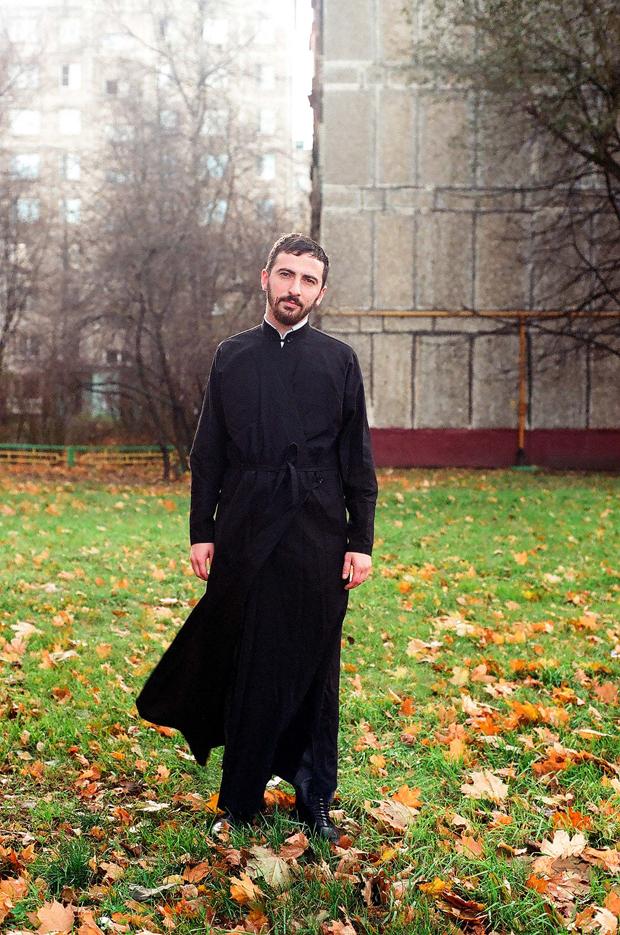
Andrzej Kmicic
Andrzej, 28, is the co-owner of an advertising agency and a neo-Nazi. “I can’t recall the exact moment I became a skinhead and national socialist, at 16 or so,” he says. At 18, Kmicic, along with fellow founders, invented Format18, a violent neo-Nazi group based in Moscow that was suspected of being involved in the murder of almost 600 immigrants in less than a year.
Kmicic is part of a new hate initiative named Occupy Paedophilia [Ed. note: as seen in the Human Rights Watch video featured above], a self-proclaimed vigilante group that has so far enjoyed almost total impunity for its treatment of its victims. No one has been prosecuted and the group even appears to have unspoken official support.
Occupy Paedophilia started months ago as a movement against paedophiles, luring potential sex offenders online and then filming and shaming them. But the group is now targeting young homosexuals. Group members say they see homosexuality and paedophilia as morally indistinguishable.
“There’s nothing good I could think of about gay people.”
Photos: Supplied by Isabella Moore unless otherwise accredited.
